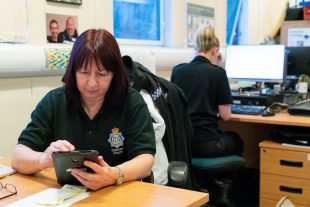
Mindfulness in policing trial
Over the past five years, the mental health of police officers and staff has become the focus of increasing attention. In response, pockets of the policing community have become interested in the benefits of mindfulness. Mindfulness is a way of engaging with the world that involves focussing on the present moment with openness and kindness. It can be trained via meditation and other exercises that help people avoid ‘autopilot’.
The College of Policing recently decided to test the impact of mindfulness training on police wellbeing, resilience and performance. The University of East Anglia supported this work.
Our randomised controlled trial (RCT) gave police officers and staff across five police forces access to either Headspace or Mindfit Cop: online mindfulness training resources. The 1,322 volunteer participants were divided randomly into three equal groups: Headspace users, Mindfit Cop users and a 6-month waiting list control group.
The study found that after six months, the average wellbeing, life satisfaction, resilience and performance of individuals in the Headspace and MindFit Cop groups improved compared to individuals in the waiting list control group. Neither online resource reduced absence, but self-reported presenteeism (working while sick) did go down. Participants who engaged with MindFit Cop and Headspace reported benefits such as reduced stress, better sleep and greater focus. As a result, MindFit Cop was made available to everyone in policing for free via the Oscar Kilo website.
Carrying out randomised controlled trials in real organisations is never easy. A couple of key design features helped to make this trial a success.
1. Working with the frontline
A key factor for success was working in close collaboration with frontline staff. Before the trial, Bedfordshire Police Detective Inspector Jenni McIntyre-Smith was already working on raising the profile of mindfulness in policing. As a police officer and trained mindfulness teacher, she tailored her teaching to police employees via face-to-face workshops. After a positive small-scale evaluation of her classes, she suggested developing MindFit Cop to the College of Policing. Jenni worked with experienced mindfulness trainer Michael Chaskalson to develop the online course.
Her initial work meant College researchers had a good basis for understanding how police employees might react to mindfulness, what they could get out of it and potential problems. For example, Jenni chose the name MindFit Cop carefully, to show that just as training your body can lead to greater physical strength, mental training can help achieve a fitter mind. Jenni and operational colleagues across the participating forces were included in the extensive planning stages for the RCT and were able to give invaluable advice. The trial would not have been as successful without this close collaboration.
2. Valuing our control group
We needed a control group to compare to active mindfulness groups so that we could measure the impact of the mindfulness tools. But previous policing research experience suggested that there would be a considerable dropout rate among our control group for the re-test surveys 10 weeks and 6 months after trial launch. So, it was important to make sure our control group stayed engaged.
South Wales Police mindfulness champion for the project, DS Debbie Zeraschi, made an explanatory video for the control group, unpacking the decision to ask them to wait 6 months for access and outlining the benefits of waiting, including the public service contribution of participation. We believe this contributed to the control group having the strongest retention rate of active survey respondents across the three groups in the trial.

3. Incorporating qualitative research
Despite the positive results, a quarter of participants (26%) did not engage with the resources they were offered. It was important to find out why.
Interviews with 29 participants identified difficulties finding a suitable time and place to practise, alongside various technical issues. This information was vital when making improvement suggestions for MindFit Cop (such as simplifying the registration and log in process) and preparing tips for future users on how to make the most of the training.
Without the rich detail provided by the interviews, we would have understood what worked, but not how, why or if it could work even better. Interviewing can be time-consuming and add expense, but the benefits are clear. Knowing why certain people felt less able to engage highlighted a clear path for ongoing development and improvement.
Connection
The golden thread that runs through each of these success factors is the idea of connecting with people. RCTs are complicated to implement so it can be easy to become embroiled in the minutiae of process. However, it is clear that without the experience of frontline officers and showing interest in the lived experiences of the participants, this research would have been weaker. The acknowledgements page of the report shows just how many people were involved in finding out ‘what works’ when mindfulness was trialled in policing.
Leave a comment